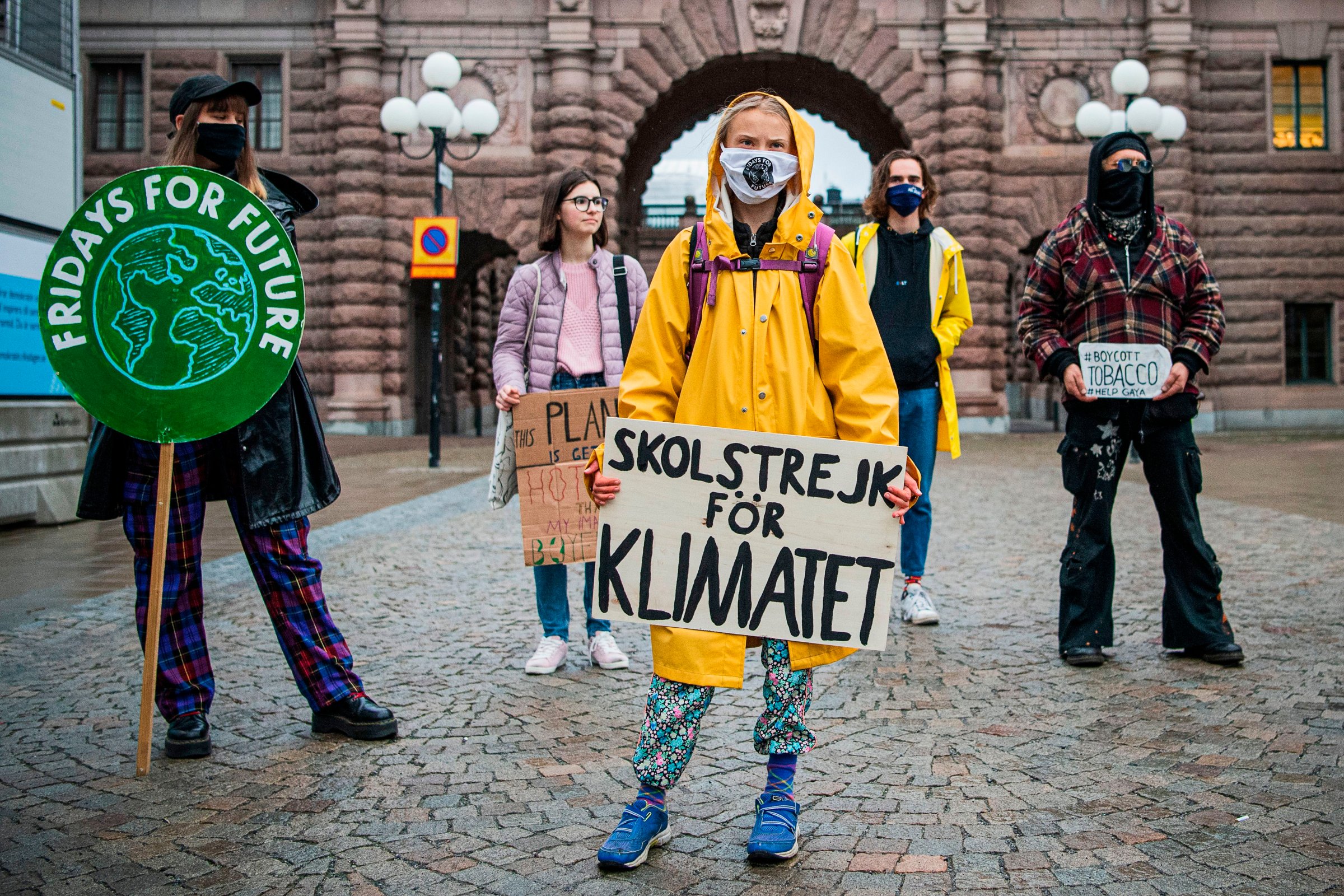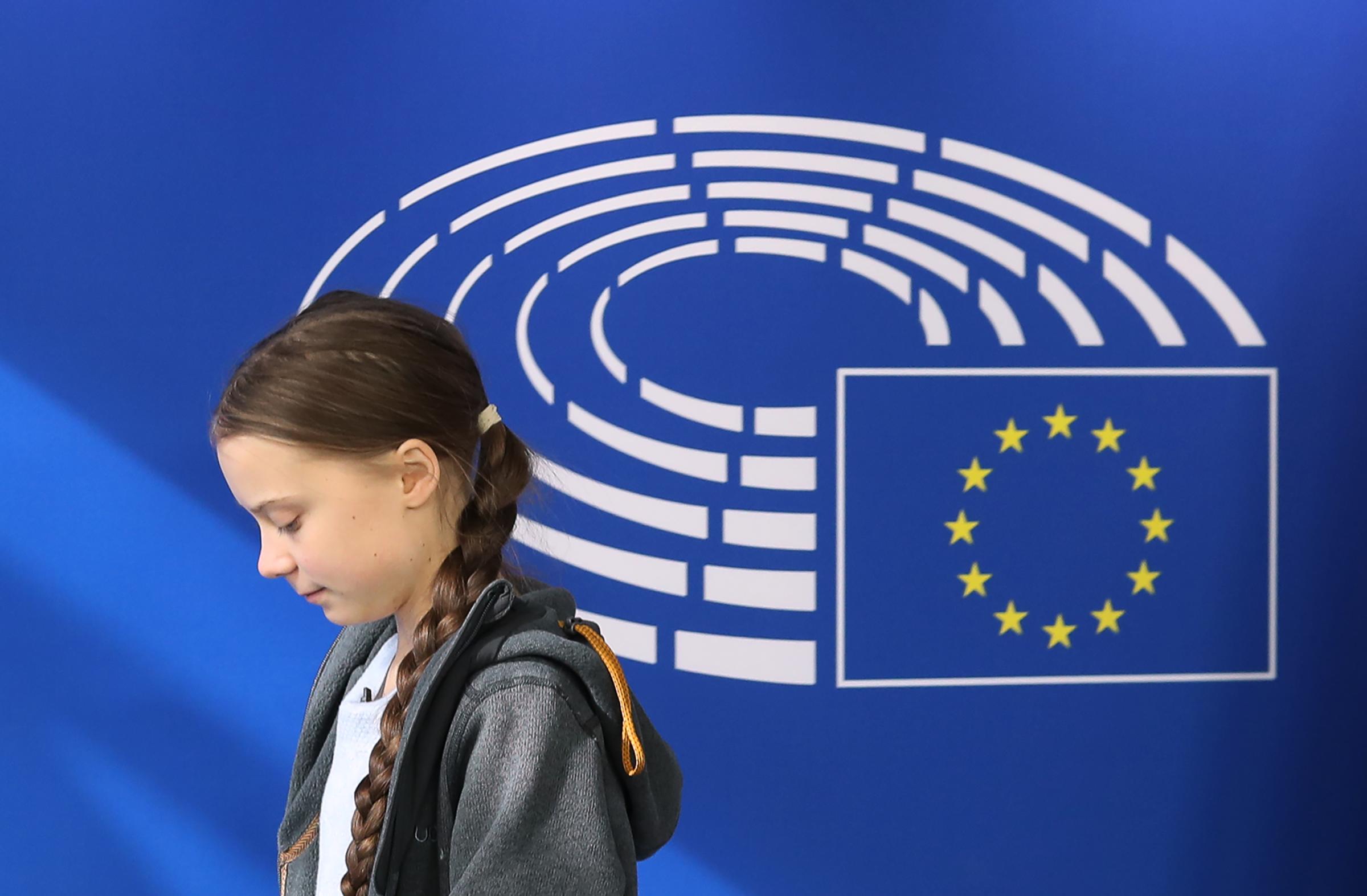
Like millions of other students around the world, Greta Thunberg is still getting used to attending school virtually. But on a Sunday morning in late November, the 17-year-old Swedish climate activist—named TIME’s Person of the Year in 2019, the youngest titleholder ever— is enjoying having some routines back. “That’s what I missed most during the last year,” she says, speaking with TIME on a Zoom call.
2019 was, after all, very busy for Thunberg: She sailed across the Atlantic to speak at the U.N. in New York City, turned the spotlight to Indigenous activists at the U.N. climate summit in Madrid, and met world leaders at the World Economic Forum in Davos.
Since undertaking her first school strike for the climate outside the Swedish Parliament in August 2018, millions more around the world have joined Thunberg’s movement, demanding urgent transformative change to save the planet from environmental catastrophe. And as the world has adapted to life during a global pandemic, so have the young activists fighting for the future of our planet.
“All movements have had to step back during this pandemic, because that’s simply what you have to do during the crisis,” says Thunberg, whose plans for 2020—to travel to Asia via the Trans-Siberian Railway—were upended by coronavirus. “You have to take a few steps back for the greater good of society.”
The introduction of lockdown measures and social distancing into everyday life has ruled out the possibility of major in-person protests, but Thunberg says she and her fellow activists were already adept at working remotely, as many of them avoid flying due to air travel’s high carbon emissions. This year, they have concentrated their efforts on digital activism, holding mass video calls and events, launching online campaigns to increase voter turnout and political participation during the U.S. elections, and filing landmark climate litigation that could order European governments to step up emissions reductions.
As movements for racial justice have gained worldwide support and attention, the climate movement is having a long overdue reflection on the intersections between racial and climate justice. “Almost always, it is us in the developed part of the world that are being listened to. And yet, we are not the ones who are being impacted the most. We are trying to change that,” Thunberg says. More than 350 young activists from around the world held a two-week virtual climate summit in late November called Mock COP 26, elevating the voices of young people around the world who are on the front lines of the climate crisis in developing countries.
COVID-19’s impact on the world, Thunberg says, is first and foremost a tragedy. “The pandemic has no advantage or positive aspects,” she continues. “We shouldn’t be speaking of lessons that can be learned from it, because lessons sound like something positive, in a way.”
Yet she says that the international response has shown how governments could act on the climate emergency. “It is possible to treat a crisis like a crisis, it is possible to put people’s health above economic interests, and it is possible to listen to the science,” she explains, noting that the pandemic has changed the role of science in many societies, as governments depend on scientific expertise to make policy decisions.

As governments speak of “green recovery plans” for a post-pandemic world, Thunberg has kept up the pressure on decision makers. She and other activists wrote an open letter to European Union (E.U.) leaders and heads of state in July, calling for actions including fossil-fuel divestment and binding annual carbon budgets. After the letter, they met in person with German Chancellor Angela Merkel, and virtually with E.U. Commission President Ursula von der Leyen and Italian Prime Minister Giuseppe Conte. Thunberg was unimpressed.
“It’s the same as always, they say ‘we’re not doing enough, but at least it’s better than nothing,’” Thunberg says. “But the time for that is over, we now need to do the impossible.”
And despite the youth movement’s campaigning, the European Parliament voted in October in favor of a watered-down reform of the E.U.’s common agricultural policy, which will continue direct payments to farmers with weak or non-existent green conditions attached. For Thunberg, it was another example of how leaders and politicians say one thing, yet do another. “You see that they are more than happy to vote for and to advocate for policies, which will affect things in 20 or 30 years’ time. But when it comes to something that actually will have an impact on us right here right now, they don’t want to touch it, because that is too uncomfortable.”
Read More: How Teen Climate Activist Greta Thunberg Got Everyone to Listen
So while she sees the election of Joe Biden as President of the U.S. as a symbolic departure from “the other one” as she refers to outgoing President Donald Trump, she warns against complacency. “We can’t go back to sleep and think things are solved now. On the contrary, that should make us even more committed to continuing pushing even harder. Changes will only happen if we keep pushing—if we keep being very, very annoying, and repeat these things over and over again.”
Thunberg will turn 18 in January, and seems more confident and assertive than the child who unexpectedly started a global movement more than two years ago. Like most of us, she’s unsure of her plans for next year, although she still wants to travel across Asia eventually. “I’m just going to take things as they come,” she says, “and try to take it one one day at a time.” Yet on the threshold of adulthood, she remains firmly convinced of her mission. “Of course, I’m going to continue to do everything I can to push in the right direction, no matter what the circumstances are.”
—With reporting by Madeline Roache/London
More Must-Reads from TIME
- How Donald Trump Won
- The Best Inventions of 2024
- Why Sleep Is the Key to Living Longer
- How to Break 8 Toxic Communication Habits
- Nicola Coughlan Bet on Herself—And Won
- What It’s Like to Have Long COVID As a Kid
- 22 Essential Works of Indigenous Cinema
- Meet TIME's Newest Class of Next Generation Leaders
Contact us at letters@time.com